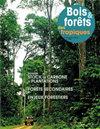Towards optimizing acorn use as animal feed in Tunisia: evaluation and impact on natural regeneration
IF 0.6
4区 农林科学
Q3 FORESTRY
引用次数: 3
Abstract
In Mediterranean forests, besides the conflict between forest managers and local populations who are often poor and dependent on livestock for survival, the cost of raw materials used in animal feed is increasingly a burden for farmers. There is growing recognition that wise use of acorns can reduce feed costs and enhance sustainable participatory governance of these woodlands. This paper aimed to carry out a quantitative, qualitative and economic evaluation of acorn potential in a cork oak forest in north-western Tunisia and to investigate the impact of their post-dispersal on natural regeneration. Quantities were estimated in November and February, respectively for acorns collected directly from trees and from the ground. Time-dependent monitoring of acorn quality and numbers of new seedlings was also conducted from autumn 2014 to spring 2015. The results show a significant decrease in acorn quantity from 5.28 ± 4.61 t/ha in November to 0.684 ± 0.1 t/ha in February. However, this loss did not put the early stages of natural cork oak regeneration at risk since the percentage of acorns not able to germinate was estimated at only 37% in late February. Furthermore, the average number of new seedlings was estimated in April at 40,000 seedlings/ha. A model was fitted to predict tree acorn production and to establish the best agroforestry system to optimize acorn use. Based on acorn quantity and quality data, earlier acorns should be directed to nursery and livestock production and the later acorns to wildlife and natural regeneration.在突尼斯优化橡子用作动物饲料:评价及其对自然再生的影响
在地中海森林中,除了森林管理者与当地居民之间的冲突之外(当地居民往往很穷,依靠牲畜为生),用于动物饲料的原材料的成本日益成为农民的负担。人们越来越认识到,明智地利用橡子可以降低饲料成本,并加强这些林地的可持续参与性治理。本文旨在对突尼斯西北部某栓皮栎林的橡子潜力进行定量、定性和经济评价,并探讨其扩散后对自然更新的影响。分别在11月和2月对直接从树上和从地上收集的橡子进行了数量估计。2014年秋季至2015年春季对橡子质量和新苗数量进行了随时间变化的监测。结果表明:橡果产量由11月的5.28±4.61 t/ha显著下降至2月的0.684±0.1 t/ha;然而,这一损失并没有使天然栓皮栎再生的早期阶段处于危险之中,因为在2月底,橡子无法发芽的比例估计只有37%。此外,4月份估计新苗的平均数量为4万株/公顷。拟合模型预测橡子产量,建立最佳农林业系统,优化橡子利用。根据橡子数量和质量数据,早期橡子应用于苗圃和畜牧生产,后期橡子应用于野生动物和自然再生。
本文章由计算机程序翻译,如有差异,请以英文原文为准。
求助全文
约1分钟内获得全文
求助全文
来源期刊

Bois et Forets Des Tropiques
FORESTRY-
CiteScore
1.50
自引率
16.70%
发文量
31
审稿时长
>12 weeks
期刊介绍:
In 1947, the former Tropical Forest Technical Centre (CTFT), now part of CIRAD, created the journal Bois et Forêts des Tropiques. Since then, it has disseminated knowledge and research results on forests in intertropical and Mediterranean regions to more than sixty countries. The articles, peer evaluated and reviewed, are short, synthetic and accessible to researchers, engineers, technicians, students and decision-makers. They present original, innovative research results, inventions or discoveries. The journal publishes in an international dimension. The topics covered are of general interest and are aimed at an informed international audience.
 求助内容:
求助内容: 应助结果提醒方式:
应助结果提醒方式:


